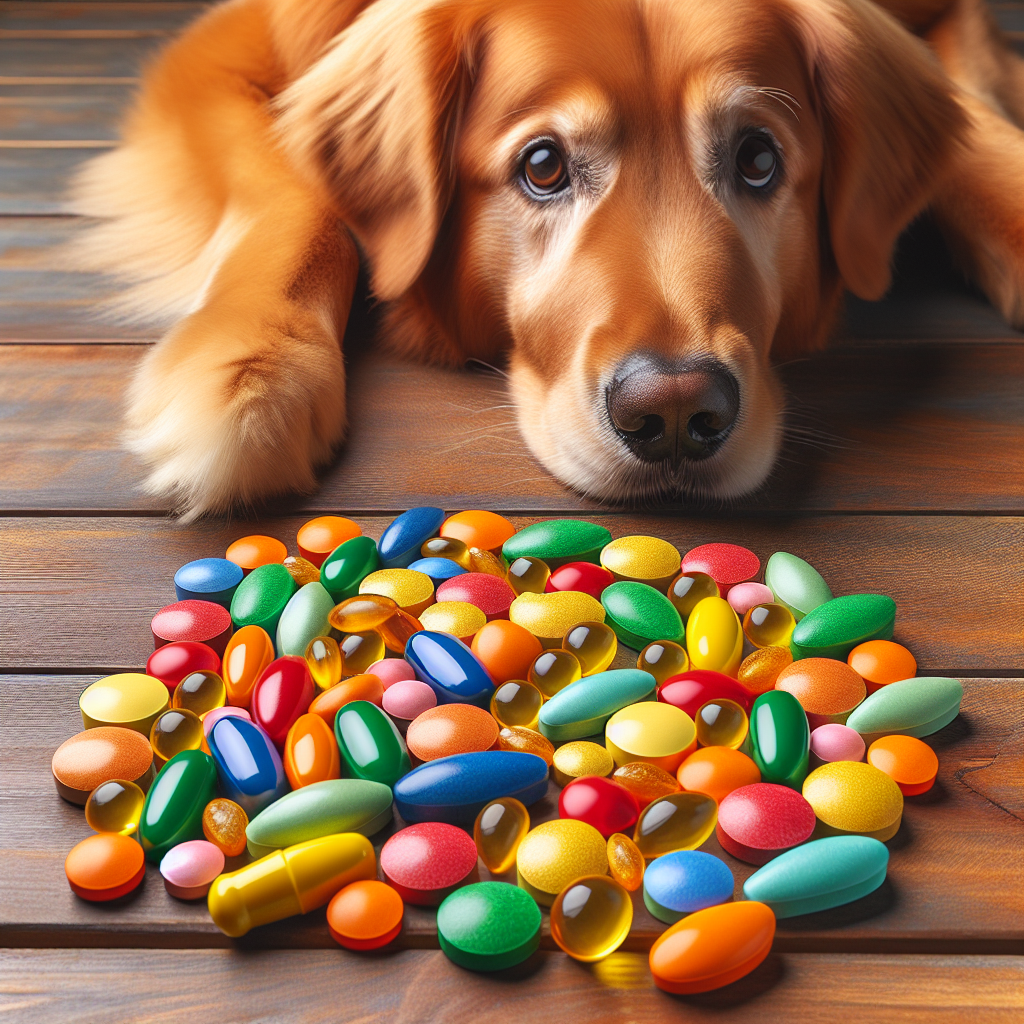
Key Takeaways
-
Intervertebral disc disease (IVDD) is a common condition in dogs that can benefit from specific dietary supplements.
-
Essential nutrients like Omega-3 fatty acids, glucosamine, chondroitin, antioxidants, and B vitamins support spinal health.
-
It’s crucial to be aware of the potential toxicity of certain supplements, especially when they are not formulated for dogs.
-
Always consult your veterinarian before starting any new supplement regimen for your dog.
-
Maintaining a healthy weight and regular exercise can help prevent IVDD and support overall spinal integrity.
1. The Role of Supplements in Managing Disc Disease
While there’s no magic pill to cure IVDD, certain supplements can support spinal health and possibly slow the disease’s progression. Supplements can enhance the diet of dogs with IVDD by providing essential nutrients that are beneficial for maintaining the integrity of discs and the overall health of the spine. But remember, these supplements are to be used in conjunction with a healthy diet and lifestyle, not as a replacement for veterinary care.
Before we dive into the specifics, let’s make something clear: supplements can be extremely beneficial, but they can also be harmful if not used correctly. Therefore, it’s vital to understand what supplements can support your dog’s spine health and which ones could be potentially dangerous.
2. Preventing Dog Disc Disease with Nutrition
Prevention is always better than cure, and when it comes to IVDD, a balanced diet rich in specific nutrients can play a pivotal role in maintaining your dog’s spinal health. A diet that supports the spine will include a range of vitamins and nutrients that contribute to the strength and flexibility of the vertebrae and discs.
3. Best Vitamins for Spinal Health
Several vitamins are key for maintaining the health of your dog’s spine. Vitamins such as Vitamin E and Vitamin B complex support nerve health and muscular function, which are crucial for a strong back. Ensuring your dog’s diet includes these vitamins, either through food or supplements, can help maintain their spinal integrity.
4. Nutrients That Support Intervertebral Disc Integrity
When it comes to the nutrients that specifically support intervertebral disc health, there are a few stars you should know about:
-
Omega-3 Fatty Acids: These are anti-inflammatory powerhouses that can help reduce inflammation around the spinal discs.
-
Glucosamine and Chondroitin: These two nutrients are the building blocks of cartilage and can help maintain the cushioning effect of the discs.
-
Antioxidants: Nutrients like Vitamin C and E can help combat oxidative stress that can lead to tissue damage.
Let’s break these down a bit further to understand how they contribute to your dog’s spinal health.
5. Antioxidants: Combatting Oxidative Stress in Canine Discs
Oxidative stress is a bit like rust inside the body—it can damage cells, proteins, and DNA. This stress plays a role in many diseases, including IVDD, by contributing to the degeneration of discs. Antioxidants are the body’s defense against this oxidative stress. They work by neutralizing free radicals, which are unstable molecules that can harm cellular structures. A diet rich in antioxidants can help protect your dog’s spinal health.
6. Glucosamine and Chondroitin: Building Blocks for Joint Health
Glucosamine and chondroitin are two supplements that often go hand-in-hand when we talk about joint health. They are naturally found in cartilage and help to keep it healthy and resilient. When it comes to IVDD, these supplements may help in maintaining the integrity of the discs, which are essentially the ‘joints’ between the vertebrae.
-
Glucosamine has anti-inflammatory properties and supports the repair of damaged cartilage.
-
Chondroitin attracts fluid into the connective tissue, which helps to cushion the joints (or in this case, the discs).
Most importantly, these supplements are not a quick fix. They need to be given consistently over time to see benefits. Also, not all products are created equal, so it’s important to choose a high-quality supplement.
For example, you might see a product that says it contains glucosamine but check the label—how much glucosamine is actually in each dose? Is it enough to make a difference? These are the types of questions you should be asking when picking a supplement for your dog.
7. Vitamin E and Selenium: A Power Duo for Muscular Support
Vitamin E and selenium work together in the body to protect cells from damage. Vitamin E is a fat-soluble antioxidant that helps protect cell membranes from oxidative damage, while selenium is a trace mineral that boosts the body’s natural antioxidant defenses. For dogs with IVDD, this combo supports muscle health around the spine, which can help stabilize and protect the spinal column.
8.The B Vitamins: Nerve Health and Beyond
B vitamins are a group of water-soluble vitamins that play a vital role in nerve function and repair. They help in maintaining the health of myelin, the protective sheath around nerve fibers. A deficiency in certain B vitamins can lead to nerve damage, which can exacerbate conditions like IVDD.
Here’s a quick rundown of a few B vitamins and their roles:
-
Vitamin B1 (Thiamine): Helps in nerve transmission.
-
Vitamin B6 (Pyridoxine): Involved in the creation of neurotransmitters.
-
Vitamin B12 (Cobalamin): Essential for nerve regeneration and repair.
These vitamins are typically found in meat, eggs, and dairy, so ensure your dog’s diet includes these food items or consider a B-complex supplement if needed.
9. Tips for Preventing Disc Disease in Dogs
While genetics play a role in IVDD, there are things you can do to help minimize the risk of your dog developing this condition. A proactive approach to your dog’s spinal health includes maintaining a healthy weight, regular exercise, and a supportive environment.
Maintaining a Healthy Weight: Its Impact on Spinal Health
Excess weight puts unnecessary stress on your dog’s spine and discs, increasing the risk of IVDD. Keeping your dog at a healthy weight through a balanced diet and regular exercise is crucial. If you’re unsure what a healthy weight looks like for your breed, consult your vet. They can give you a target weight range and help you with a diet plan if necessary.
Besides that, be mindful of the treats you give. Treats should not make up more than 10% of your dog’s daily calorie intake, and it’s best to opt for healthy options like carrot sticks or apple slices over high-fat commercial treats.
Exercise Routines: Strengthening the Spine Safely
Regular exercise is important for all dogs, but especially those prone to or suffering from IVDD. Exercise strengthens the muscles that support the spine, which can help prevent injury. However, it’s important to choose the right type of exercise. Swimming is a great low-impact activity that can strengthen back muscles without putting stress on the spine.
Environmental Adjustments: Keeping Your Dog’s Spine Safe
Your home environment can also play a role in spinal health. For example, if your dog is a jumper, providing steps or ramps to their favorite spots can help reduce the impact on their spine. Non-slip mats can prevent injuries caused by slipping, and orthopedic beds can provide extra support for your dog’s back while they rest.
Remember, small adjustments can make a big difference in the long run for your dog’s spinal health.
10. Implementing a Supplement Strategy
Now that you know which supplements can benefit your dog’s spinal health, let’s talk about how to implement them into your dog’s diet.
Assessing Your Dog’s Diet: When to Add Supplements
Before adding supplements, take a close look at your dog’s current diet. Is it balanced? Is your dog getting all the necessary nutrients from their food? If not, supplements can help fill the gaps. However, if your dog is already on a well-balanced diet, adding too many supplements can actually do more harm than good. It’s all about balance.
Choosing the Right Supplement: Quality Over Quantity
When it comes to supplements, quality is key. Look for supplements that are specifically formulated for dogs and have a good reputation. Check for certifications or approvals from veterinary associations, which can indicate a higher standard of product quality and safety.
How to Introduce New Supplements to Your Dog’s Diet
When introducing a new supplement, start slowly. Add it to your dog’s diet in small amounts and watch for any adverse reactions. If your dog tolerates the supplement well, you can gradually increase to the recommended dosage. Always follow the instructions on the supplement label or those provided by your veterinarian.
Monitoring Your Dog’s Response to Supplements
Once you start your dog on supplements, keep a close eye on their response. You’re looking for positive changes such as increased mobility, less pain, and an overall happier demeanor. It’s also important to watch for any negative reactions, such as gastrointestinal upset, which could indicate that a supplement isn’t right for your dog.
If you’re ever in doubt about how your dog is reacting to a supplement, stop giving it and consult your veterinarian. They can help you determine if the supplement is the cause and guide you on the next steps.
Signs Your Dog Might Benefit From Disc Disease Supplements
Knowing when your dog might need a little extra nutritional support is crucial. Look out for signs such as difficulty jumping, yelping when touched, a hunched back, reluctance to move, and changes in behavior that might suggest pain or discomfort. These could be indicators that your dog’s spinal health is compromised and that supplements could be beneficial.
It’s essential to act swiftly if you notice these signs. Early intervention can make a significant difference in managing IVDD and maintaining your dog’s quality of life.
FAQs
What is Dog Disc Disease, and How Does It Affect My Pet?
Dog disc disease, also known as IVDD, affects the cushioning discs in your dog’s spine. When these discs herniate or degenerate, they can press on the spinal cord and nerves, causing pain, nerve damage, and potentially paralysis. It’s a serious condition that requires immediate attention and often a multifaceted approach to treatment and management.
What Are the Most Essential Supplements for Dog Disc Disease?
The most essential supplements for dogs with disc disease are those that support joint health and reduce inflammation. These typically include:
-
Omega-3 fatty acids
-
Glucosamine and chondroitin
-
Antioxidants like vitamins E and C
-
B vitamins for nerve health
How Can I Tell if My Dog Needs Supplements for Disc Disease?
If your dog is showing signs of back pain, stiffness, or difficulty with movement, they may benefit from supplements. However, the best way to determine if your dog needs supplements is to consult with your veterinarian. They can provide a diagnosis and recommend specific supplements based on your dog’s individual needs.
Are There Any Risks Associated with Disc Disease Supplements?
While most supplements are safe when used correctly, there are risks associated with incorrect dosages or using supplements not specifically formulated for dogs. Always follow the recommended dosage and choose high-quality products. Consult your vet before starting any new supplement regimen.
Can Dietary Changes Alone Prevent Disc Disease in Dogs?
Dietary changes can contribute to a healthier spine, but they may not be enough to prevent disc disease on their own, especially if your dog is genetically predisposed. Combining a balanced diet with regular exercise, weight management, and environmental adjustments provides the best defense against IVDD.






